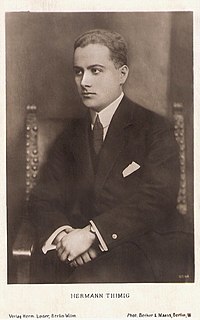
Louis Spohr, baptized Ludewig Spohr, later often in the modern German form of the name Ludwig, was a German composer, violinist and conductor. Highly regarded during his lifetime, Spohr composed ten symphonies, ten operas, eighteen violin concerti, four clarinet concerti, four oratorios, and various works for small ensemble, chamber music, and art songs. Spohr invented the violin chinrest and the orchestral rehearsal mark. His output spans the transition between Classical and Romantic music, but fell into obscurity following his death, when his music was rarely heard. The late 20th century saw a revival of interest in his oeuvre, especially in Europe.

The Vienna State Opera is an opera house and opera company based in Vienna, Austria. The 1,709-seat Renaissance Revival venue was the first major building on the Vienna Ring Road. It was built from 1861 to 1869 following plans by August Sicard von Sicardsburg and Eduard van der Nüll, and designs by Josef Hlávka. The opera house was inaugurated as the "Vienna Court Opera" in the presence of Emperor Franz Joseph I and Empress Elisabeth of Austria. It became known by its current name after the establishment of the First Austrian Republic in 1921. The Vienna State Opera is the successor of the Vienna Court Opera, the original construction site chosen and paid for by Emperor Franz Joseph in 1861.

Heinrich August Marschner was the most important composer of German opera between Weber and Wagner.

Aribert Reimann is a German composer, pianist and accompanist, known especially for his literary operas. His version of Shakespeare's King Lear, the opera Lear, was written at the suggestion of Dietrich Fischer-Dieskau, who sang the title role. His opera Medea after Grillparzer's play premiered in 2010 at the Vienna State Opera. He was a professor of contemporary Lied in Hamburg and Berlin. In 2011, he was awarded the Ernst von Siemens Music Prize for his life's work.
Carl Gottlieb Reißiger was a German Kapellmeister and composer.

The Theater auf der Wieden, also called the Freihaus-Theater auf der Wieden or the Wiednertheater, was a theater located in the then-suburban Wieden district of Vienna in the late 18th century. It existed for only 14 years (1787–1801), but during this time it was the venue for the premiere of no fewer than 350 theatrical works, of which the most celebrated was Mozart's opera The Magic Flute. During most of this period the director of the theater was Emanuel Schikaneder, remembered today as librettist and impresario of The Magic Flute.

Georg Caspar Schürmann was a German Baroque composer. His name also appears as Schurmann and in Hochdeutsch as Scheuermann.
Christian Louis Heinrich Köhler was a German composer, conductor and piano teacher.

Hermann Thimig was an Austrian stage and film actor. He appeared in 102 films between 1916 and 1967.
Johann Sigismund Kusser or Cousser was a composer born in the Kingdom of Hungary who was active in Germany, France, and Ireland.

Hermann Winkelmann was a German Heldentenor, notable for creating the title role in Richard Wagner's Parsifal in 1882.
Hermann Reutter was a German composer and pianist who worked as an academic teacher, university administrator, recitalist, and accompanist. He composed several operas, orchestral works, and chamber music, and especially many lieder, setting poems by authors writing in German, Russian, Spanish, Icelandic, English, and ancient Egyptian and Greek, among others.
Michael Leinert is a well-known stage director, dramaturg, editor and author. His father, Friedrich Leinert was a respected composer, conductor and Professor of Music in Hannover; Michael Leinert's mother was an operatic and concert singer.

Das goldene Kreuz is a German-language opera by Ignaz Brüll in two acts, with a libretto by Salomon Hermann Mosenthal. It premiered in Berlin in 1875 and was a huge success, later playing on many stages around the world including London and New York City, where it was equally well-received.
Stefan Soltész is an Austrian conductor of Hungarian origin. Trained in Vienna, he was from 1997 to 2013 he was artistic director of the Aalto Theatre and Generalmusikdirektor in Essen, leading the opera house to international recognition.

Carl Friedrich Clemens Weinmüller was an operatic bass and theatre director. A bass with the imperial court opera in Vienna, he is known for performing Rocco in the premiere of Beethoven's Fidelio.
Hermann Gallos was an Austrian operatic tenor and academic teacher. He was a long-standing ensemble member of the Vienna State Opera and performed regularly at the Salzburg Festival from 1922 to 1950, in roles such as Pedrillo in Mozart's Die Entführung aus dem Serail and Valzacchi in Der Rosenkavalier by Richard Strauss.
Josef Hopferwieser was an Austrian operatic tenor.

Hermann Dechant is an Austrian, conductor, flautist, musicologist, composer and music publisher.
Hermann Wiedemann was a German operatic baritone and academic teacher. He was a long-term member of the Imperial Court Opera in Vienna from 1916, where he appeared as Faninal in Der Rosenkavalier by Richard Strauss 196 times, and as Beckmesser in Wagner's Die Meistersinger von Nürnberg 155 times. He was Beckmesser also in a recording from the Salzburg Festival 1937, conducted by Arturo Toscanini. He performed internationally at leading opera houses and festivals, such as the Teatro Colón of Buenos Aires and the Zoppoter Festspiele. He appeared in the world premieres of Wolf-Ferrari's I gioielli della Madonna in Berlin, Busoni's Die Brautwahl in Hamburg, and Lehár's Giuditta in Vienna.











